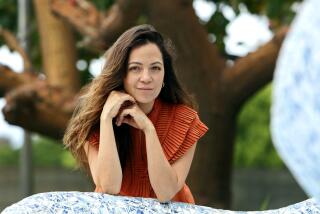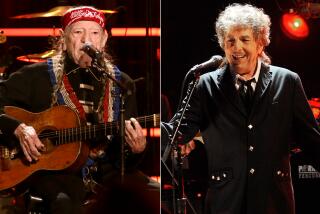James Brown stirs up ‘Soul’ for the Bowl
- Share via
When James Brown performs at the Hollywood Bowl on Wednesday, it will be a homecoming of sorts, albeit a few decades late and two miles down the block.
In November 1969, Brown joined 20 other musicians at the now-defunct United Recordings Studio on Sunset Boulevard, a short jaunt from the Bowl. They came to record “Soul on Top,” a big-band-meets-soul album that remains one of the most eclectic in Brown’s career.
The Bowl performance marks the first time Brown, 73, has performed the album in public, and the hugely influential R&B; pioneer says that the audience “can expect me to be very versatile. They’re going to learn a lot about me they didn’t know.”
Brown’s fans probably felt the same way in 1970 when “Soul on Top” came out. That era of his career found the budding “minister of the new super-heavy funk” releasing dozens of groundbreaking, gritty soul and funk singles such as “Say It Loud -- I’m Black and I’m Proud (Part 1),” “The Chicken,” “Mother Popcorn,” and “Give It Up or Turn It Loose.” With big-band renditions of country and pop chestnuts such as “Your Cheatin’ Heart” and “For Once in My Life,” “Soul on Top” was a surprising detour. For Brown, though, it wasn’t unprecedented. In early 1969, he paired with a Cincinnati jazz trio led by drummer Dee Felice for “Gettin’ Down to It,” recording jazz standards such as “Willow Weep for Me” and “It Had to Be You.”
“I was raised up on these songs,” Brown said during a recent interview, and he saw an opportunity to put his own inimitable R&B; twist on things. “I knew how to do things with them that other people couldn’t do.”
With the Dee Felice Trio, Brown re-created the hushed intimacy of a lounge act. But for “Soul on Top,” he wanted a bolder and literally brassier sound. He reached out to an old friend: arranger Oliver Nelson, who was then living in Los Angeles, writing for television and movies. As a saxophonist who had played with such artists as Louis Jordan and Quincy Jones, Nelson knew how to craft the powerful horn arrangements that Brown envisioned for the album.
“With Nelson, I got somebody who could give some power,” Brown said. “His horns shout but he could make ‘em talk,” he explained, mimicking the sound of a trumpet to demonstrate.
Brown then chose one of Nelson’s old bandleaders, drummer Louie Bellson, as his conductor.
“I got a phone call one day -- ‘I’m James Brown and I want to record with you,’ ” said Bellson, who knew of Brown but had never worked with him.
Bellson replied, “Are you sure you got the right guy?” but once he was convinced of Brown’s interest he recruited some of the finest talent in Los Angeles, including Ray Brown on bass and Buddy Collette and Ernie Watts on saxophones.
Brown laughed as he recalled how his own veteran saxophonist, Maceo Parker, was intimidated: “He was scared to play,” said Brown. “He couldn’t pull himself together because he had read about those cats and admired them so much.”
Did Brown have any jitters himself? “I don’t worry about that because [what] I’m doing, they can’t do. Thank God!”
The United session took only two days, with Brown sequestered in a booth while the band’s music was fed in through headphones. “He was having a ball in that little telephone booth,” said Bellson. “He was screaming, ‘The band! The band!’ ”
On the album, Brown is heard yelling commands such as, “Hit me!” just as he does with his regular stage band.
The album wasn’t one of the star’s biggest sellers -- it peaked at No. 125 on the Billboard chart, far below his customary double-digit showings. Most R&B; fans treated it as a novelty, while jazz purists balked at claiming it for their canon. But more than 35 years later, certain songs on “Soul on Top” still sound as intriguing and compelling as when they were first heard in 1970.
Brown and Nelson took the sweet but sleepy ballad “September Song” and remade it completely. Gone were the slow strings and woodwinds of Sinatra’s classic version, replaced by a “boogaloo” rhythm built around a funky Brown bass line and Bellson’s jangling backbeat.
Likewise, Brown coaxed the band into a rousing rendition of his own “It’s a Man’s, Man’s, Man’s World,” screaming over a thrusting phalanx of horns with Parker peppering the track alongside him.
Not everything worked. The version of “Papa’s Got a Brand New Bag” feels stiff and clunky compared to earlier versions. But “Soul on Top” also offers genuine moments of sublime surprise, such as Brown’s serene but soulful take on Frankie Laine’s “That’s My Desire.”
“Soul on Top” was out of print for decades. When Verve finally reissued it on CD in 2004, Hollywood Bowl Jazz Program Manager Laura Connelly came up with the idea to approach Brown about performing the album in concert. He took to the idea, but the last, crucial link came when bassist Christian McBride became the Bowl’s Creative Chair for Jazz this year. Not only had McBride participated in the reissuing of the CD, but he also credits Brown as “the center to my musical universe.... ‘Fan’ is an understatement. I’ve been quite familiar with ‘Soul on Top’ since I was a teenager.”
McBride explained that those who think of Brown as solely an R&B; talent have only understood part of his genius:
“Listen to what a great improviser he is.... Almost every other singer in the genre has to have it laid out for them ahead of time.... The way [Brown] is able to make up these rhythms and make something happen out of nothing ... you can only get that with a jazz musician’s mentality.”
For the concert, McBride followed in Bellson’s footsteps and gathered a 17-member big band featuring many of the Southland’s finest, including drummer Clayton Cameron and veteran saxophonist Tom Scott.
“We needed guys who could read well and who could swing like hell,” said McBride. During the concert, which opens with retro-soul singer Angie Stone, Brown will be jumping back and forth between McBride’s big band and his own retinue, performing classics from his catalog alongside most of “Soul on Top’s” songs. Bellson will also be a special guest for one song.
Reflecting on the uniqueness of that album within his career, Brown said that working on “Soul on Top” was “a step into another dimension,” another piece of a musical legacy that remains one of pop’s most innovative. As if to accent that point, Brown noted that San Francisco Symphony conductor Michael Tilson Thomas had just spent half a day with him at the singer’s home in Beech Island, S.C.
“He’s been down here at my home, trying to find my technique,” explained Brown. “He’s one of the best in the world ... yet all the stuff he knows, James Brown got something different. Ain’t that something?”
*
James Brown
Where: Hollywood Bowl, 2301 N. Highland Ave., Hollywood
When: 8 p.m. Wednesday
Price: $1-$120
Contact: (323) 850-2000
More to Read
The biggest entertainment stories
Get our big stories about Hollywood, film, television, music, arts, culture and more right in your inbox as soon as they publish.
You may occasionally receive promotional content from the Los Angeles Times.










